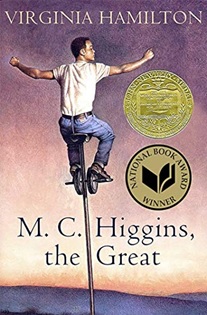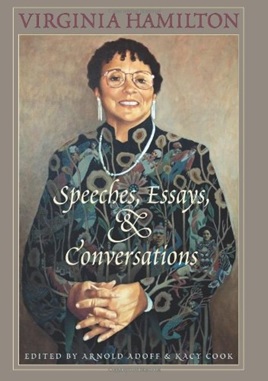Born: March 12, 1934
Died: February 19, 2002
Ohio connection: Birth
Yellow Springs
“If you can dream it, then you can have it.” A powerful axiom that encapsulates the accomplishments and triumphs of its speaker, Virginia Hamilton.
Descendant of a maternal grandfather who escaped from slavery in Virginia to settle in Yellow Springs, Ohio, Hamilton grew up amidst siblings, cousins, uncles and aunts on a large farm. Rural sights, sounds, and smells lingered in her imagination and remained an influence beyond her formative years. Hamilton’s parents were masterful storytellers who kept her spellbound, inculcating a reverence for the construction and delivery of a finely-crafted story. Within those stories, a respect for heritage, culture and tradition was stressed. They are the same dynamic themes that are found throughout Hamilton’s fiction for children and young adults.
Virginia Esther Hamilton was born in Yellow Springs, Ohio, on March 12, 1934, the youngest of five children of Kenneth James Hamilton and Etta Belle (née Perry) Hamilton. As a child, Hamilton was encouraged to read and write widely. She excelled in her studies and graduated at the top of her class, earning a full scholarship to nearby Antioch College where her writing talent was further encouraged. In 1956, she transferred to Ohio State University where she majored in literature and creative writing. Hamilton spent her summers in New York City working as a bookkeeper. She found that she was earning more during those brief vacations than was possible in Ohio so she yielded to the temptation to leave Antioch College before graduation and to move to New York in 1958. With a part-time clerical job and a low-rent apartment in the East Village, Hamilton began to devote her time to writing. During her fifteen-year stay in New York, she lived within a fascinating and diverse community of musicians, artists, and other writers. Here she met a kindred soul, Arnold Adoff — teacher, poet, graduate student, and impresario of jazz musicians. On March 16, 1960, the couple married. Hamilton continued to write, and her first book, a children’s story entitled Zeely, was finally published in 1967. It was hailed by both critics and readers alike.
Hamilton went on to write over 35 more books including two biographies, six collections of folktales, and many fictional works. Several of her books have been honored with multiple awards including M. C. Higgins, the Great (1974) which earned her the distinction of being the only author to have won the Newbery Medal, the Boston-Globe Hornbook Award, the Lewis Carroll Shelf Award, the National Book Award, and the International Board on Books for Young People Award for a single published book. Other works include Sweet Whispers, Brother Rush (1982), The Planet of Junior Brown (1971), A Little Love (1984), A White Romance (1987), and Anthony Burns: The Defeat and Triumph of a Fugitive Slave (1988). Three books were published posthumously: Bruh Rabbit and the Tar Baby Girl (2003), Wee Winnie Witch’s Skinny: An Original African American Scare Tale (2004), and Virginia Hamilton: Speeches, Essays, and Conversations (2010).
Hamilton and Adoff later returned to Yellow Springs, Ohio, to raise their children. Virginia Hamilton was the recipient of every major award and honor in her field. Her impact on children’s literature was great.
Virginia Hamilton died of breast cancer on February 19, 2002, in Dayton, Ohio.
Books

Awards:
Notable Children’s Book citation, American Library Association, 1967, and Nancy Block Memorial Award, Downtown Community School Awards Committee, New York, both for Zeely; Edgar Allan Poe Award for best juvenile mystery, Mystery Writers of America, 1969, for The House of Dies Drear; Ohioana Literary Award, 1969; John Newbery Honor Book Award, 1971, for The Planet of Junior Brown; Lewis Carroll Shelf Award, Boston Globe-Horn Book Award, 1974, John Newbery Medal, and National Book Award, both 1975, and Gustav-Heinemann- Friedinspreis fur kinder und Lugendbucher (Dusseldorf, Germany), 1991, all for M. C. Higgins, the Great; John Newbery Honor Book Award, Coretta Scott King Award, Boston Globe-Horn Book Award, and American Book Award nomination, all 1983, all for Sweet Whispers, Brother Rush; Horn Book Fanfare Award in fiction, 1985, for A Little Love; Coretta Scott King Award, New York Times Best Illustrated Children’s Book citation, Children’s Book Bulletin Other Award, and Horn Book Honor List selection, all 1986, all for The People Could Fly: American Black Folktales; Boston Globe-Horn Book Award, 1988, and Coretta Scott King Award, 1989, both for Anthony Burns: The Defeat and Triumph of a Fugitive Slave; John Newbery Honor Book Award, 1989, for In the Beginning: Creation Stories from around the World; D.H.L., Bank St. College, 1990; Regina Medal for lifetime achievement, Catholic Library Association, 1990; Hans Christian Andersen Award, U.S. nominee, 1992, for body of work; Laura Ingalls Wilder Award for lifetime achievement, American Library Association, 1995; received a MacArthur Foundation “genius” grant, 1995; Coretta Scott King Award, 1996, for Her Stories; L.L.D., Wright State University; honorary doctorate, Ohio State University.
Additional Resources
Wikipedia: Virginia Hamilton
Virginia Hamilton Conference



